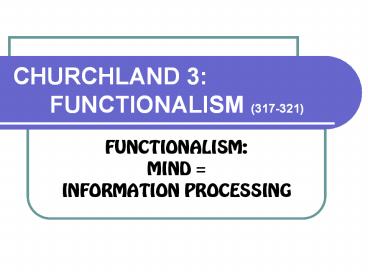CHURCHLAND 3: FUNCTIONALISM (317-321) - PowerPoint PPT Presentation
1 / 10
Title: CHURCHLAND 3: FUNCTIONALISM (317-321)
1
CHURCHLAND 3 FUNCTIONALISM (317-321)
- FUNCTIONALISM
- MIND
- INFORMATION PROCESSING
2
FUNCTIONALISM
- 1 Metaphysical basis of
- Cognitive Science
- 2 Functional objects/concepts
- chair, heart, wing, Beethovens 5th
- 3 Main metaphor (from computing)
- mind/brain software/hardware
- translation mind relates to brain
- as software relates to hardware
3
Heir to Behaviorism(p. 317,see pp. 309-11 for
behaviorism)
- Behaviorism
- 1) Stimulus? 2) Response
- Functionalism
- 1) environmental effects stimulus
- 2)other mental states ?
- 3) bodily behavior
4
2. Functional Isomorphism (pp317-18)
- Functionalism accommodates
- Multiple Instantiation
- Animal, alien (or computer) made of different
substance than we are could have same mental
state/s as us, if s/he (it) has state/s with same
function. - Think of chairs/stoves/etc. made of very
different materials with different designs.
5
3. Essence of mental (p. 318 top left)
- What makes a mind a mind is
- its functionnot its substance.
- Core idea
- each type of
- mental state/process/ability/etc.
- is some sort of
- information state/process/ability/etc.
6
4. Token Identity Materialism (p. 318)
- type/token kind/instance
- Type identities H2O water
- mind brain
- consciousness brain process
- Token identities that chair steel structure
- this mind this brain
- that mind that computer
- this pain this brain process
- that pain that hydraulic process
7
5. Methodological Autonomy (p. 318)
- Just as Software Engineering
- (design and construction of software)
- is distinct from Computer Engineering
- (design and construction of computer)
- So too
- Psychology (study of brain function)
- is distinct (hence autonomous) from
- Neuroscience (study of brain biology, chemistry,
physics, etc.)
8
Arguments against Functionalism
- 1. Inverted Qualia Argument (318-19)
- Qualia qualities of consciousness
- Red may look to me like green looks to you, etc.,
though we both call red red (are functionally
identical). - Different qualia may have same function, so
functionalism is incomplete it does not tell us
what each others experience is like.
9
Arguments against Functionalism
- 2. Absent Qualia Argument (319-20)
- If we built a robot that was functionally like a
human, how do we know it has any qualia at all? - Suppose, for instance, the robot was controlled
by a building full of experts via a radio
linkare we really to think that somehow the
robot ( experts) actually has (have)
consciousness? - ZOMBIES
10
Arguments against Functionalism
- 3. Species Specific Identities (320-21).
- Temperature is a single property that is
instantiated differently in a solid, a liquid, a
gas, or a vacuum. BUT there are still type
identities - e.g, temp in a gas
- mean kinetic molecular energy
- By Analogy perhaps
- Consciousness in a human brain process































